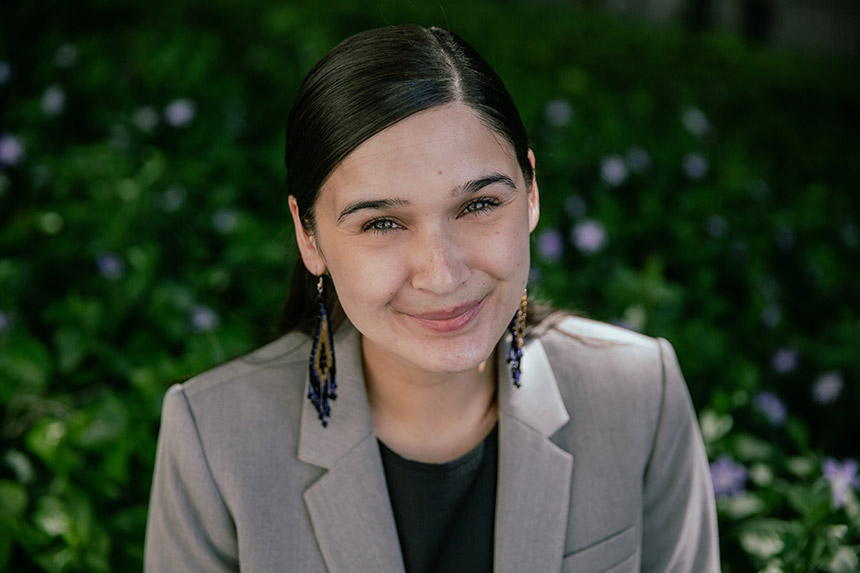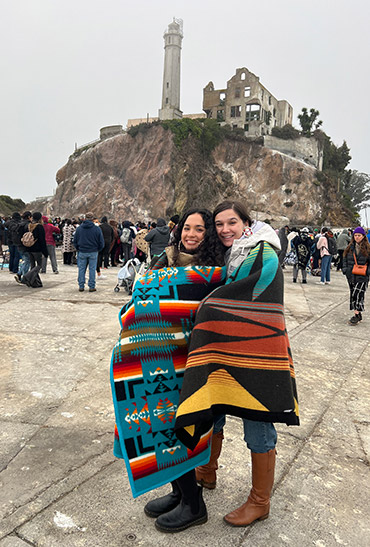
Helping others is baked into the DNA of Gabrielle Cirelli ’24. Her parents instilled the importance of giving back, she’s volunteered at food banks and soup kitchens since middle school, and she has taken on multiple leadership roles at Berkeley Law in the public interest arena.
That work includes helping the Food Justice Project, which assists students in appealing rulings that denied or terminated their CalFresh benefits. It also involves co-chairing Berkeley’s Native American Law Students Association chapter, which promotes the success of Native students, creates awareness around Native issues, and fosters a culture of unity, cooperation, and respect.
And recently, Cirelli has advanced tribal causes through another rewarding endeavor: helping to update the constitution of her own tribe, the Habematolel Pomo of Upper Lake, California. She is the youngest of the tribe’s five Constitutional Review Committee members, and the only law student.
Cirelli worked for Jenner & Block and Uber last summer, and this summer will work for Goodwin Procter. During that time, she will also continue to engage in what she calls “the ongoing process” of revamping her tribe’s constitution. Completing that effort will likely take a few more years, in part to factor in tribal elections that are not held annually, and Cirelli says she’s in it for the long haul.
Below, she describes this unique opportunity and both the demands and fulfillment it brings:
* * * *

From a young age, I witnessed my family’s involvement working and volunteering with our tribe. Throughout my childhood, my family would often visit our ancestral homeland of Upper Lake to attend tribal meetings, community events, and family gatherings. I have many fond memories of spending summer afternoons on the lake with my cousins and discussing the tribe in the evenings over dinner.
I was always inspired hearing about how my tribe achieved federal recognition, its growth and prosperity, and how my family’s continued involvement has assisted the tribe in reaching new heights. It was from these family trips and dinner conversations that my interest in working with my tribe grew.
After finishing my undergraduate degree at UCLA and moving back to the Bay Area, it felt like the right time to begin working with my tribe. Initially, I was unsure how I wanted to be involved. I was interested in the legal field but did not think I could work with my tribe in a related capacity. After speaking with one of the tribe’s attorneys and my family members, I decided to join the Constitutional Review Committee (CRC).
The CRC is tasked with amending the constitution of the Habematolel Pomo of Upper Lake. Working with attorneys, the committee works to revise the constitution based on feedback from tribal members. Our constitution was ratified many years ago, and as the tribe has grown the constitution needs to be updated to accommodate this growth and adjust to new developments.
With the assistance of attorneys, the CRC drafts proposed amendments to the constitution. We meet every month, but also host presentations and additional meetings as needed. Because the constitution is dense, we’ve broken the document up into smaller sections to review and propose possible amendments. This was done to not overwhelm tribal members with having to review many proposed amendments at one time.

The most pressing issue we’re working on is vacancy language. Our constitution lists a very short and outdated process for when an Executive Council (EC) member can no longer serve the tribe and must step down before their term ends. The current process is not fair for tribal members. It doesn’t give a timeline or determine when holding a special election should occur, set the qualifications an interim appointee must have, or protect the tribe’s interest when an EC member must step down. Our constitution also doesn’t state what is to take place when two or more EC positions are vacant. Our committee has addressed this in our proposed amendments.
Going section by section and incorporating feedback from tribal members, the CRC drafts proposed amendments and then educates the general membership through presentations, meetings, emails, and letters on what they would mean for the tribe. The proposed amendments are presented and the general membership votes to determine whether they are accepted.
If the proposed amendments pass, we move to the next section of the constitution to begin drafting new ones. If they do not pass, the CRC then discusses with the general membership why they did not vote to approve them and adjusts the language before the next vote.
We’ve reviewed other tribes’ constitutions that have been updated in recent years, allowing us to see what others have done in addressing similar problems and concerns while also noting what won’t work for us. We’re also fortunate to partner with attorneys who have gone through the process of updating constitutions with other tribes before. Their insight is very helpful as we amend ours, especially when trying to balance varying opinions and problem-solve.
Being on the CRC for three years has been rewarding and challenging. With tribal members being from different generations, each group has varying thoughts on what changes, if any, should be made to the constitution. Incorporating feedback from tribal members and balancing different views, working with attorneys, ensuring tribal members know what the proposed amendments mean for the tribe’s future, and ensuring the constitution can support the tribe in the years to come is no small task.
Despite the challenges, I view working with the CRC as my way of ensuring the Habematolel Pomo of Upper Lake will continue to exist and prosper for future generations. It is also my small way of honoring those before me. My great-grandmother, great-aunt, grandfather, mother, aunts, uncles, and countless cousins have and continue to support our tribe. Working on the CRC is my way of ensuring their legacy and hard work continues.